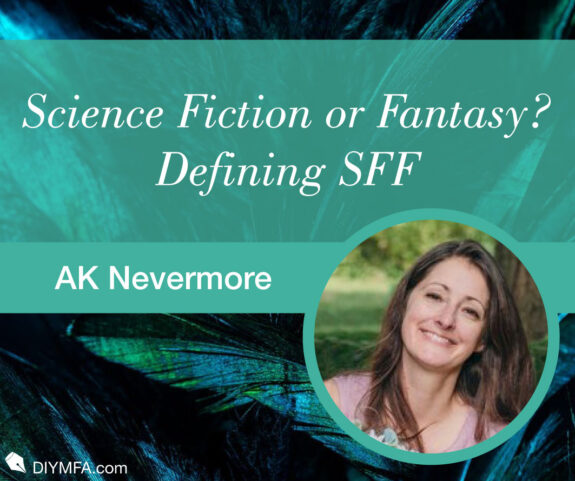Let’s be honest, defining genres can be a real bear, and one of the blurriest lines is the one between Science Fiction and Fantasy. If you’re like me, your manuscript has elements of both. So how do you market it? Cue the glazed eyes and the descent of that nebulous SFF cloud. But what does that really mean? I’ve seen the term used interchangeably with Speculative Fiction, which, according to the Cambridge Dictionary is:
A type of story or literature that is set in a world that is different from the one we live in, or that deals with magical or imagined future events.
Well, gee, that clears it up. Insert eye-roll here. More like encompass two massive genres and a smattering of others. So, how do you differentiate between them, and why is it important to? On the surface, it sounds like a dumb question. I mean, Fantasy is fairies and junk, and Science Fiction is all about the aliens, right? Mmm… not so much.
Think of Speculative Fiction as North America, then Science Fiction and Fantasy as Canada and the USA, respectively. The problem being that in this alternative universe, the USA’s Northern border is in dispute, and in some places, non-existent. The same can be said down south, and Mexico’s got a direct portal to Canada. But SFFH is a whole ‘nother article—we’ll come back to Horror another time. Suffice to say, there’s crossover, which makes for one heck of a tangle.
The term SFF is used to paint a broad stroke across the top two-thirds of our map. When talking about generalities, like topics at a conference, ok fine. When pitching your manuscript? Not so much. That’s like trying to get your European parents to foot the bill for a flight to North America without telling them exactly where you’re going. There’s a big difference between New York City, New York, and Moose Jaw, Saskatchewan—not to mention a whole lot in between.
Which is why knowing what makes Science Fiction, Science Fiction, and Fantasy, Fantasy, is important. Granted, there are sub-genres that do fall on that nebulous border, but they have names, and you should use them. In my opinion, saying your work is SFF is a cop-out. Yeah, I said it, but I can understand the temptation. I mean, trying to distinguish between Science Fiction and Fantasy can be more work than sorting Aunt Bev’s button collection.
And trust me, that’s a freaking job… but it doesn’t have to be.
When differentiating between Science Fiction and Fantasy, it all comes down to one thing.
Technology vs. Transcendental
Sounds clear-cut enough, right? Yeah, you’d think so, and you’d be wrong again.
Prime example? Star Wars is technically a Fantasy and a Space Opera, with Science Fiction elements. Say what? Seriously. Check out the ins and outs of that can of worms here.
Yeah, went over my head too, so let’s go super basic by consulting two of my buddies, Cambridge and Webster:
What’s considered Fantasy?
A type of story or literature that is set in a magical world, often involving traditional myths and magical creatures, and sometimes ideas or events from the real world, especially from the medieval period of history.
And that Space Opera thingamabob?
A futuristic melodramatic fantasy involving space travelers and extraterrestrial beings.
Right, I get that. But it still doesn’t really answer my question, or does it? When you think about Star Wars, what’s the overwhelming theme, regardless of which book or movie you’re binging on, like, even before the starships in a galaxy far, far away?
It’s all about the Force.
Yep. That nebulous universal power that’s manipulated by good and evil throughout the series’s extensive volumes. It’s the core theme that the world is built around, driving the story, from plot to character, and everything in between. It’s what defines the work.
See, Science Fiction, at its root, is:
A form of fiction dealing mainly with the impact of actual or imagined science on society or individuals. It must have a scientific factor as an essential orienting component.
Ahh… now you see where I’m going with this? Basically, if the Force resulted from a genetic mutation or a nuclear event, Star Wars would be classified as Science Fiction. Since it’s not, it’s a work of Fantasy, and nuts to the Death Star. Pretty tricky, huh?
Yep. The Devil’s in the details… and often the sub-genres.
So if Fantasy boils down to the transcendental, and Science Fiction’s all about the tech, what happens when a fallen angel and a guy infected with a lab-borne virus that causes vampirism hook up at a bar?
Whelp, like any good literary, alcohol-fueled one-night stand, a sub-genre is born. In this case, Urban and/or Paranormal SFF, with a heavy dash of Romance thrown into the mix.
Yes, Romance. Look, despite what your personal feelings on the genre may be, let me just mention that it’s been the highest-grossing genre by a landslide for decades. Now think about it; with SFF holding its own in the top five, is it any wonder successful authors combine them?
Exactly.
Unfortunately, no-brainer or not, that just further muddies the genre issue. I mean, as a reader, I don’t care how Amazon classifies books as long as my vamp/angel rendezvous comes up when I plug the title into the search bar. But as an author, it’s in your best interest to seek clarity.
Now we come back to the why of it. If readers don’t particularly care what you call it, why should you?
Because if you want to effectively market your book, you need to know where it will sit on the shelf.
Sure, you can toss it under the generic category of Speculative Fiction or SFF, but that really doesn’t give an agent or a publisher any idea of where your book might fit into their catalog at a glance.
And that’s a problem—because remember my Aunt Bev’s button collection? Reviewing a slush pile is basically like sorting buttons for a living.
Guess what happens to the generic ones from my Uncle Harvey’s dress shirts.
Buh-bye.
Yeah, ouch. Taking your time to understand the nuances of genres hidden beneath the SFF cloud, and where your two acres are on that continent, will help you land the agent that’s right for your book. How? Well, by tailoring your query letter to highlight the aspects of your manuscript that will most appeal to them. It will help you find those dreaded comp titles too.
I’ll dive more into that next time. In the interim, instead of throwing up your hands and succumbing to the SFF cop-out, check out the lay of the land. There’s nothing better than finding out where you belong, kicking up your feet, and getting to know the neighbors.
Still confused about SFF and sub-genres? There’s a great round-up of the more popular SFF sub-genres with their definitions here. Keep in mind, it’s not an exhaustive list (Notably, Paranormal Fantasy is missing) But it’s a great place to start, and for a quick rundown of the top 35 genres, Reedsy does an awesome job with this blog post.

AK Nevermore is an emerging author of science fiction and urban fantasy with spice. She enjoys operating heavy machinery, freebases coffee, and gives up sarcasm for Lent every year. Unable to ignore the voices in her head, and unwilling to become medicated, she writes about dark worlds, perversely irreverent and profound, and always entertaining.
You can find her on her website or follow her on Facebook, Instagram, and Twitter.







